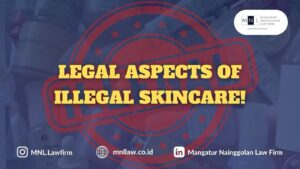
LEGAL ASPECTS OF ILLEGAL SKINCARE!
The Indonesian National Agency of Drug and Food Control (“BPOM”), through its official Instagram account @bpom_ri, announced that GLAFIDSYA Glowing Booster Cell is an unregistered and illegal cosmetic product. More seriously, the skincare product owned by Dr. Reza Gladys was declared hazardous to health because its use does not comply with statutory regulations. This raises the question—what are the legal aspects concerning illegal skincare?
Skincare Classified as Cosmetics
Cosmetic manufacturing activities must comply with BPOM Regulation No. 23 of 2019 concerning Technical Requirements for Cosmetic Ingredients, as amended by BPOM Regulation No. 17 of 2022 (“Peraturan BPOM 17/2022”). Article 1(1) of BPOM Regulation 17/2022 defines cosmetics as materials or preparations intended for use on the external parts of the human body such as the epidermis, hair, nails, lips, and external genital organs, or the teeth and oral mucous membranes, primarily for cleansing, perfuming, changing appearance, and/or correcting body odor, or for protecting or maintaining the body in good condition.
Based on this definition, skincare falls within the category of cosmetics as long as it is intended for the outer parts of the human body, such as the skin, with use limited to the external surface. If a skincare product is intended for application beneath the skin, such as by injection, it no longer qualifies as a cosmetic but is categorized as a medicinal preparation. Consequently, skincare classified as a medicinal preparation must comply with legislation governing medicinal products.
Cosmetic Supervision
Supervision of cosmetics falls under BPOM’s authority. Pursuant to Article 4 of Presidential Regulation No. 80 of 2017 concerning the National Agency of Drug and Food Control (“Perpres 80/2017”), BPOM is mandated to ensure that drugs, food, and cosmetics circulating in the market are safe, beneficial, and of good quality. Furthermore, BPOM’s authority to ensure cosmetic safety includes issuing marketing authorization (izin edar) and certificates in accordance with safety, efficacy, and quality standards, as well as product testing results under applicable laws. Any cosmetic product lacking such authorization and certification is deemed illegal.
Sanctions for the Circulation of Illegal Cosmetics
If a cosmetic product is declared illegal, consumers should take preventive measures by being vigilant and discerning when purchasing and using cosmetic products. Should an illegal cosmetic product cause consumer harm, business actors involved in its manufacture, distribution, and sale may be subject to the following sanctions:
-
- Administrative Sanctions
BPOM is authorized to impose administrative measures such as issuing a stern warning, product recall, destruction of the product, and revocation of the offender’s business license for violation of BPOM regulations.
-
- Civil Sanctions
Under Article 45 of Law No. 8 of 1999 on Consumer Protection (“UU Perlindungan Konsumen”), consumers harmed by a business actor may file claims through a consumer dispute settlement body or through court proceedings. In addition to the standing provided by Article 45 of the Consumer Protection Law, harmed consumers may also bring civil action for tort (onrechtmatige daad) under Article 1365 of the Indonesian Civil Code (KUHPerdata).
-
- Criminal Sanctions
Business actors engaged in illegal cosmetic activities, who commit prohibited acts as provided in Chapter IV of the Consumer Protection Law, may be criminally prosecuted under Articles 62 and 63 of the Consumer Protection Law, and further under Article 435 in conjunction with Article 138(2) of the Health Law, carrying penalties of imprisonment for up to 12 years or a fine of up to IDR 5 billion.
Conclusion
Skincare qualifies as a cosmetic as long as it is used on the external skin. Skincare used beneath the skin, such as via injection, is categorized as a medicinal preparation. The distribution of skincare products in violation of cosmetic regulations is deemed illegal, and business actors involved may face administrative, civil, and criminal sanctions.
Legal Basis
- Law No. 8 of 1999 on Consumer Protection.
- Law No. 17 of 2023 on Health.
- Presidential Regulation No. 80 of 2017 on the National Agency of Drug and Food Control.
- BPOM Regulation No. 24 of 2017 on Criteria and Procedures for Drug Registration.
- BPOM Regulation No. 23 of 2019 on Technical Requirements for Cosmetic Ingredients.
Authors:
Salma Ariana Taruna, S.H.
Eva Rutnauli Sinaga
Editor:
Muhammad Arief Ramadhan, S.H.
